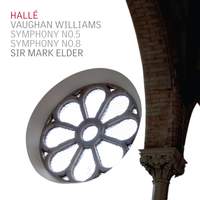Recording of the Week,
Vaughan Williams from the Hallé and Mark Elder
I must admit that Ralph Vaughan Williams is one of those composers who elicit mixed feelings from me. On the one hand there are pieces that I adore, such as A Sea Symphony and the Fantasia on a Theme by Thomas Tallis, and then there are works that do less for me, such as the Oboe Concerto. Fortunately for me, both pieces on a new disc from Sir Mark Elder and the Hallé fall very much into the former camp as far as I am concerned. Combining perhaps Vaughan Williams’s most popular symphony (No. 5) with one of the lesser-known ones (No. 8), this latest offering on the Hallé’s own label is truly a delight.

Coming after the dissonant, somewhat severe Fourth Symphony, the Fifth is a noticeable return to what one might call a more typical Vaughan Williams sound. Written between 1938 and 1943, the symphony uses several themes from his then-incomplete opera, The Pilgrim’s Progress, and contains some of his most ravishing music.
The playing on this live recording is superb throughout: listen, for example, to the opening of the third movement (Romanza) to hear the Hallé’s astonishingly lush strings introducing a tender, noble cor anglais solo, or the real sense of menace from the snarling brass and caustic, biting woodwind towards the end of the second movement. For me, though, the stars of this recording are definitely the horns: their sound is consistently glorious, from their opening, hushed call to their magnificent contributions to the scrunchy climaxes of the first and third movements. All of these moments are also perfectly handled by Elder, with beautifully-shaped phrasing from start to finish.
Less familiar to most, I expect, is the Eighth Symphony: written only a few years before the composer’s death (and indeed premièred by the Hallé under Sir John Barbirolli in 1956), it is the shortest of his symphonies, and is most notable for its enlarged percussion section, including vibraphone, xylophone, tubular bells, glockenspiel, and tuned gongs (in Vaughan Williams’s own words, “all the ’phones and ’spiels known to the composer”). The gamelan-like effect of all this tuned percussion makes for an uniquely interesting sound amongst his symphonies, especially at the end of the piece, where their joyous, festive peals put me in mind of the last of the Five Mystical Songs. The very beginning of the symphony, on the other hand, with its desolate trumpet solo answered by pizzicato strings and a spooky vibraphone, looks forward, to my ear at least, to the works of another great English symphonist, Sir Malcolm Arnold.
The second movement, for wind and brass only, is a pleasingly jaunty Scherzo alla marcia, and the Hallé responds fantastically to this, with the players clearly relishing the spiky, characterful writing given to them. In contrast to this, the strings alone perform the third movement, a meditative Cavatina. The searching, contemplative writing in this movement is again brought out wonderfully by the Hallé strings; the central section is in my opinion on a par with any of the more affecting passages of Elgar, and I’ve had this particular movement on repeat quite a lot, wanting to relish the beguiling sounds over and over again!
All in all this is a splendid recording from Elder and the Hallé; add this to their previous release of the Second Symphony (A London Symphony) and you have the emergence of one of the finest modern cycles on disc. I would like to take this opportunity to request that they hurry up and record the remaining symphonies, as I’ll certainly be first in the queue to buy them!
Hallé, Sir Mark Elder
Available Formats: CD, MP3, FLAC, Hi-Res FLAC



